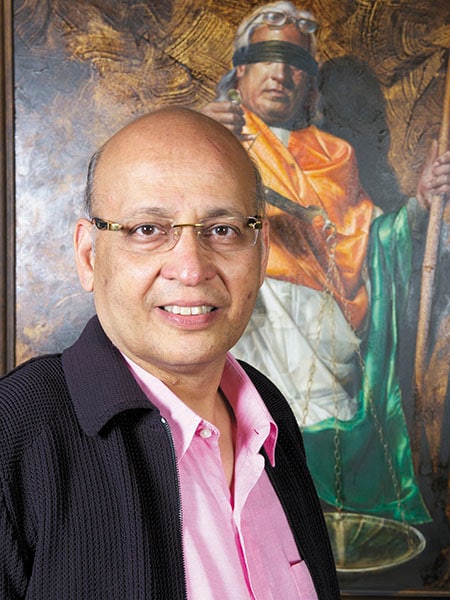
The Tata-Mistry battle is not a personalised fight: Abhishek Singhvi
The Ratan Tata-Cyrus Mistry row is an institutional corporate battle says Abhishek Manu Singhvi, counsel for the Tata group

Abhishek Manu Singhvi
Image: Amit Verma
Q. Though the Tata group has filed several caveats in various courts, there is no sign of Cyrus Mistry taking legal recourse. Why? Image: Amit Verma
Firstly, that’s a question you have to put to Mr Mistry. Secondly, this is an institutional corporate battle and I don’t think it should be personalised. Nobody is suggesting that either Mr Ratan Tata or Mr Mistry is not a captain of the industry. Both are senior, respected figures. And I don’t think I have ever seen it as a tu tu-main main personalised fight. Moreover, at the end, in corporate boardrooms, in AGMs/EGMs, etc, it is the collectivities, and not individuals, which give final verdicts. Lastly, it is always my belief that things are best left out of court. However, if litigation is inevitable, it should be honourably fought.
Q. Could Tata Sons have avoided such a situation by giving Cyrus Mistry the reasons for his ouster? Would an adequate notice have helped?
I have already answered that by saying that things are best left out of court. Matters come to me only at the end. So I am not aware of the inner dynamics. But yes, purely on press reports, it is understood that discussions were held for honourable exits, but perhaps somewhere the communication line snapped. Now, I suppose that it has gone too far and that stage has become irreversible.
Q. Is it right to remove independent directors like Nusli Wadia who have supported Mr Mistry?
Again, Mr Wadia is another respected name in the corporate industry. As a senior counsel, I have been briefed in the past by solicitors for Shapoorji Pallonji, Bombay Dyeing and Britannia Industries. However, once corporate collectivity decides, I think it is wrong to see it as a personal issue. I’d also agree that no attempt should be made by any party to defame or belittle anyone, and I don’t think that has been the intent here.
Q. Does this development throw up any kind of shortcomings in the Companies Act with respect to removal of independent directors?
I don’t think one can say there are shortcomings in the law. Corporate majorities are the final arbiter and majority decision-making, both in the boardroom and in the general body, is normally not reviewed by courts unless there is a direct and clear violation either in the acts or with the Articles of Association or in some sense, the decision is on the face of it, perverse. I must add that the Tata companies’ actions up to date would legally not qualify for any of these three categories.
Q. Is there a need to better codify the relationship between Tata Trusts, Tata Sons and group operating companies to avoid confusion?
Firstly, I agree that lessons learnt from bad episodes must be incorporated in future legal reforms within the companies because those who do not learn the lessons of history are condemned to repeat the errors of history. Secondly, though no one can anticipate future disputes, wherever grey areas are thrown up in the Articles, they should be attended to in the near future. Lastly, though each Tata company is independent, autonomous and many individual entities are humongous in their own right, it cannot be forgotten that the umbilical cord that connects the ethos, character, history and heritage must be that of one Tata group.
Q. Do you think Tata group’s image has taken a beating?
Any dispute is avoidable and to that extent, not an individual or a group, but all parties, all corporate entities, suffer. I don’t think the core fundamentals of any Tata company are so weak as to be gravely, irreversibly, eroded or destroyed by such disputes. I would see it more like a temporary blip, an avoidable weather change, but not a seasonable one.
(This story appears in the 30 November, -0001 issue of Forbes India. To visit our Archives, click here.)
X





